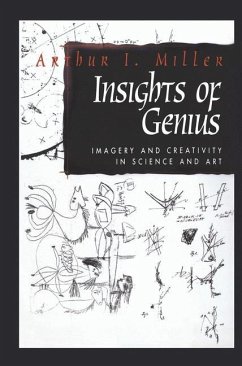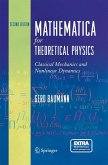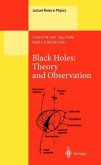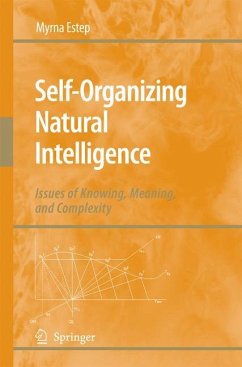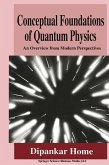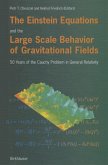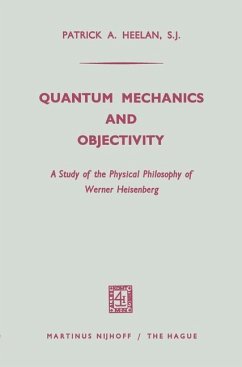- Broschiertes Buch
- Merkliste
- Auf die Merkliste
- Bewerten Bewerten
- Teilen
- Produkt teilen
- Produkterinnerung
- Produkterinnerung
Here, distinguished science historian Arthur I. Miller delves into the connections between modern art and modern physics. He takes us on a wide-ranging study to demonstrate that scientists and artists have a common aim: a visual interpretation of both the visible and invisible aspects of nature. Along the way, we encounter the philosophy of mind and language, cognitive science and neurophysiology in our search for the origins and meaning of visual imagery. At a time when the media are overeager to portray science as a godless, dehumanising exercise undermining the very fabric of society, this…mehr
Andere Kunden interessierten sich auch für
![Mathematica for Theoretical Physics Mathematica for Theoretical Physics]() Gerd BaumannMathematica for Theoretical Physics42,99 €
Gerd BaumannMathematica for Theoretical Physics42,99 €![Black Holes: Theory and Observation Black Holes: Theory and Observation]() Black Holes: Theory and Observation37,99 €
Black Holes: Theory and Observation37,99 €![Secrets of the Old One Secrets of the Old One]() Jeremy BernsteinSecrets of the Old One20,99 €
Jeremy BernsteinSecrets of the Old One20,99 €![Self-Organizing Natural Intelligence Self-Organizing Natural Intelligence]() Myrna EstepSelf-Organizing Natural Intelligence74,99 €
Myrna EstepSelf-Organizing Natural Intelligence74,99 €![Conceptual Foundations of Quantum Physics Conceptual Foundations of Quantum Physics]() Dipankar HomeConceptual Foundations of Quantum Physics147,99 €
Dipankar HomeConceptual Foundations of Quantum Physics147,99 €![The Einstein Equations and the Large Scale Behavior of Gravitational Fields The Einstein Equations and the Large Scale Behavior of Gravitational Fields]() The Einstein Equations and the Large Scale Behavior of Gravitational Fields37,99 €
The Einstein Equations and the Large Scale Behavior of Gravitational Fields37,99 €![Quantum Mechanics and Objectivity Quantum Mechanics and Objectivity]() Patrick A. HeelanQuantum Mechanics and Objectivity39,99 €
Patrick A. HeelanQuantum Mechanics and Objectivity39,99 €-
-
-
Here, distinguished science historian Arthur I. Miller delves into the connections between modern art and modern physics. He takes us on a wide-ranging study to demonstrate that scientists and artists have a common aim: a visual interpretation of both the visible and invisible aspects of nature. Along the way, we encounter the philosophy of mind and language, cognitive science and neurophysiology in our search for the origins and meaning of visual imagery.
At a time when the media are overeager to portray science as a godless, dehumanising exercise undermining the very fabric of society, this sixth book by Professor Miller shows how scientists are struggling to understand nature, convince their peers, inform the public and deal with the reactions to their research.
Thus, Insights of Genuis must interest everyone who cares about science and its place in our culture.
At a time when the media are overeager to portray science as a godless, dehumanising exercise undermining the very fabric of society, this sixth book by Professor Miller shows how scientists are struggling to understand nature, convince their peers, inform the public and deal with the reactions to their research.
Thus, Insights of Genuis must interest everyone who cares about science and its place in our culture.
Produktdetails
- Produktdetails
- Verlag: Copernicus / Springer New York / Springer, Berlin
- Artikelnr. des Verlages: 978-1-4612-7523-7
- 1996
- Seitenzahl: 508
- Erscheinungstermin: 31. Mai 2013
- Englisch
- Abmessung: 235mm x 155mm x 28mm
- Gewicht: 761g
- ISBN-13: 9781461275237
- ISBN-10: 1461275237
- Artikelnr.: 40735024
- Verlag: Copernicus / Springer New York / Springer, Berlin
- Artikelnr. des Verlages: 978-1-4612-7523-7
- 1996
- Seitenzahl: 508
- Erscheinungstermin: 31. Mai 2013
- Englisch
- Abmessung: 235mm x 155mm x 28mm
- Gewicht: 761g
- ISBN-13: 9781461275237
- ISBN-10: 1461275237
- Artikelnr.: 40735024
Arthur I. Miller, geboren in New York, ist Physiker und emeritierter Professor für Geschichte und Philosophie der Naturwissenschaften am University College in London. Er veröffentlichte mehrere Bücher über die Relativitätstheorie sowie über Kreativität in Kunst und Naturwissenschaften.
1 Common Sense and Scientific Intuition.- At the Beginning.- The Mindset of Renaissance Scientists.- Galileo's Imagination.- Conceptual Frameworks and Common Sense.- Galileo and Newton Become Common Sense.- The Waviness of Light Waves.- Life on a Moving Platform.- A Problem with Relative Motion.- /Another Way to Think About Relative Motion.- Time and Light.- Concluding Comments.- 2 The Intuition of Atoms.- But Is Light Really a Wave?.- The Visual Imagery of Intuition.- Atoms and Solar Systems.- Atomic Intuition and Visualization.- Visualization Lost, Intuition Redefined.- Intuitivity: The Central Issue.- Another Redefinition of Intuition.- Visualization Regained, in Part.- Extending Intuition: Bohr's Correspondence Principle.- Concluding Comments.- 3 Scientific Methods.- The Verdict of Experiment or Not?.- Data, Data Everywhere....- Unwanted Precision.- Picking and Choosing Data.- Sociology Influences Science.- The Principle of Relativity.- Conservation of Energy.- Heat Is Energy.- Unification of the Sciences.- 4 Faith in an Ordered Universe.- Certainty and/or Knowledge?.- The Sign of the Time.- Carnot's Imaginary Engine.- The Birth of Uncertainty.- A Mal du Siècle Over the Fin de Siècle.- Causality in Quantum Physics.- The Image of Light.- Quantum Effects and the Corsican Brothers.- 5 Speaking Realistically About Science.- Let's Have a Reality Sandwich.- Atoms in Antiquity.- Doubts About Atomic Reality.- Positive Thinking.- A Mach Attack.- Planck Converts to Atomism.- Atomic Vindication.- On Mach's Philosophical Heirs.- Boredom Relieved, Momentarily.- Scientific Realism.- Scientific Antirealism.- The Social Side of Science.- Antirealism and Scientific Practice.- The Chic of Antirealism: Postmodernism/.- The Two Cultures.- Some Very Modern Postmodernists.- Back to Reality.- 6 The Reasonable Effectiveness of Mathematics in Physics.- Mathematics and Physics.- Pythagoras's Preestablished Harmony.- Newton, Einstein, and Minkowski's Dream.- Kant, Geometry, and the Cognitive Status of Science.- The "Right" Sort of Statement.- Non-Euclidean Geometries and Euclidean Prisons.- Poincaré, The Origins of Geometry, and the Boundaries of Thought.- Testing Geometry.- Twentieth-Century Atomism, The Platonic Turn.- Can Physics Generate Mathematics? Minkowski in Reverse.- 7 Scientific Progress and Metaphors.- The Pervasiveness of Metaphors.- The Interaction View of Metaphor.- Metaphors and Models of Scientific Thought.- Metaphor and the Emergence of Scientific Knowledge.- Meaning and Antirealism.- Language and Realism.- Relativism in Language and Science.- Metaphors, Language, and Realism.- At a Loss for Words.- Metaphors and Analogies in Particle Physics.- Do Scientists Actually Use Metaphors?.- A Platonic Interlude.- Another Nobel Prize Metaphor.- Metaphors and Scientific Progress.- Why Did Physics Develop As It Did?.- How Science Advances.- 8 Visual Imagery in Scientific Thought.- Some Background to Mental Imagery.- Visual Imagery and Computational Psychology: A Study in Architecture.- The Imagery Debate.- A Model of Mental Processing and Its Critics.- Vision.- Gestalt Psychology and Vision.- The Present Status of the Imagery Debate.- The Misuse of Language in Visual Imagery.- Thought Experiments.- Visual Imagery, Cognitive Science, and the History of Scientific Thought.- he History of Science and the Imagery Debate.- 9 Scientific Creativity.- Creativity and Digital Thought.- Creativity and Analog Thought.- A Model for Network Thinking.- Why Poincaré and Einstein?.- Poincar0 and Edouard Toulouse.- Portrait of the Mathematician.- The Scientific Creativity of Henri Poincaré.- Poincaré and Creativity Research Circa 1900/Intuition and Logic.- Poincaré on Intuition, Aesthetics, and Mental Imagery.- Poincare Introspects.- Four-Dimensional Aesthetics.- Poincare and Relativity.- Einstein and Max Wertheimer.- A Portrait of the Physicist as a Young Man.- Einstein in Love.- The Creativity of Albert Einstein.- Einstein Introspects on Intuition and Aesthetics.- Aesthetics.- Poincaré's and Einstein's Creative Thinking.- 10 Art, Science, and the History of Ideas.- Aesthetics in Art and Science.- One Person's Aesthetics and Intuition May Not Be Another's.- Science as Aesthetics.- Cubism and Quantum Mechanics.- Physicists Re-Represent.- Feynman Diagrams, Representation, and Gestalt Psychology.- The Deeper Structure of Data.- Art in the Twentieth Century.- Picasso, Geometry, and Cubism: Relations Between Developments in Cubism and Science.- Picasso, Braque, and Space.- Cubism and Relativity.- Figurative to Nonfigurative, Objects Disappear.- Art Theory and Science Theory.- Creativity in Art and Science.- Searching for Reality.- Conclusion: The New Sciences.
1 Common Sense and Scientific Intuition.- At the Beginning.- The Mindset of Renaissance Scientists.- Galileo's Imagination.- Conceptual Frameworks and Common Sense.- Galileo and Newton Become Common Sense.- The Waviness of Light Waves.- Life on a Moving Platform.- A Problem with Relative Motion.- /Another Way to Think About Relative Motion.- Time and Light.- Concluding Comments.- 2 The Intuition of Atoms.- But Is Light Really a Wave?.- The Visual Imagery of Intuition.- Atoms and Solar Systems.- Atomic Intuition and Visualization.- Visualization Lost, Intuition Redefined.- Intuitivity: The Central Issue.- Another Redefinition of Intuition.- Visualization Regained, in Part.- Extending Intuition: Bohr's Correspondence Principle.- Concluding Comments.- 3 Scientific Methods.- The Verdict of Experiment or Not?.- Data, Data Everywhere....- Unwanted Precision.- Picking and Choosing Data.- Sociology Influences Science.- The Principle of Relativity.- Conservation of Energy.- Heat Is Energy.- Unification of the Sciences.- 4 Faith in an Ordered Universe.- Certainty and/or Knowledge?.- The Sign of the Time.- Carnot's Imaginary Engine.- The Birth of Uncertainty.- A Mal du Siècle Over the Fin de Siècle.- Causality in Quantum Physics.- The Image of Light.- Quantum Effects and the Corsican Brothers.- 5 Speaking Realistically About Science.- Let's Have a Reality Sandwich.- Atoms in Antiquity.- Doubts About Atomic Reality.- Positive Thinking.- A Mach Attack.- Planck Converts to Atomism.- Atomic Vindication.- On Mach's Philosophical Heirs.- Boredom Relieved, Momentarily.- Scientific Realism.- Scientific Antirealism.- The Social Side of Science.- Antirealism and Scientific Practice.- The Chic of Antirealism: Postmodernism/.- The Two Cultures.- Some Very Modern Postmodernists.- Back to Reality.- 6 The Reasonable Effectiveness of Mathematics in Physics.- Mathematics and Physics.- Pythagoras's Preestablished Harmony.- Newton, Einstein, and Minkowski's Dream.- Kant, Geometry, and the Cognitive Status of Science.- The "Right" Sort of Statement.- Non-Euclidean Geometries and Euclidean Prisons.- Poincaré, The Origins of Geometry, and the Boundaries of Thought.- Testing Geometry.- Twentieth-Century Atomism, The Platonic Turn.- Can Physics Generate Mathematics? Minkowski in Reverse.- 7 Scientific Progress and Metaphors.- The Pervasiveness of Metaphors.- The Interaction View of Metaphor.- Metaphors and Models of Scientific Thought.- Metaphor and the Emergence of Scientific Knowledge.- Meaning and Antirealism.- Language and Realism.- Relativism in Language and Science.- Metaphors, Language, and Realism.- At a Loss for Words.- Metaphors and Analogies in Particle Physics.- Do Scientists Actually Use Metaphors?.- A Platonic Interlude.- Another Nobel Prize Metaphor.- Metaphors and Scientific Progress.- Why Did Physics Develop As It Did?.- How Science Advances.- 8 Visual Imagery in Scientific Thought.- Some Background to Mental Imagery.- Visual Imagery and Computational Psychology: A Study in Architecture.- The Imagery Debate.- A Model of Mental Processing and Its Critics.- Vision.- Gestalt Psychology and Vision.- The Present Status of the Imagery Debate.- The Misuse of Language in Visual Imagery.- Thought Experiments.- Visual Imagery, Cognitive Science, and the History of Scientific Thought.- he History of Science and the Imagery Debate.- 9 Scientific Creativity.- Creativity and Digital Thought.- Creativity and Analog Thought.- A Model for Network Thinking.- Why Poincaré and Einstein?.- Poincar0 and Edouard Toulouse.- Portrait of the Mathematician.- The Scientific Creativity of Henri Poincaré.- Poincaré and Creativity Research Circa 1900/Intuition and Logic.- Poincaré on Intuition, Aesthetics, and Mental Imagery.- Poincare Introspects.- Four-Dimensional Aesthetics.- Poincare and Relativity.- Einstein and Max Wertheimer.- A Portrait of the Physicist as a Young Man.- Einstein in Love.- The Creativity of Albert Einstein.- Einstein Introspects on Intuition and Aesthetics.- Aesthetics.- Poincaré's and Einstein's Creative Thinking.- 10 Art, Science, and the History of Ideas.- Aesthetics in Art and Science.- One Person's Aesthetics and Intuition May Not Be Another's.- Science as Aesthetics.- Cubism and Quantum Mechanics.- Physicists Re-Represent.- Feynman Diagrams, Representation, and Gestalt Psychology.- The Deeper Structure of Data.- Art in the Twentieth Century.- Picasso, Geometry, and Cubism: Relations Between Developments in Cubism and Science.- Picasso, Braque, and Space.- Cubism and Relativity.- Figurative to Nonfigurative, Objects Disappear.- Art Theory and Science Theory.- Creativity in Art and Science.- Searching for Reality.- Conclusion: The New Sciences.

